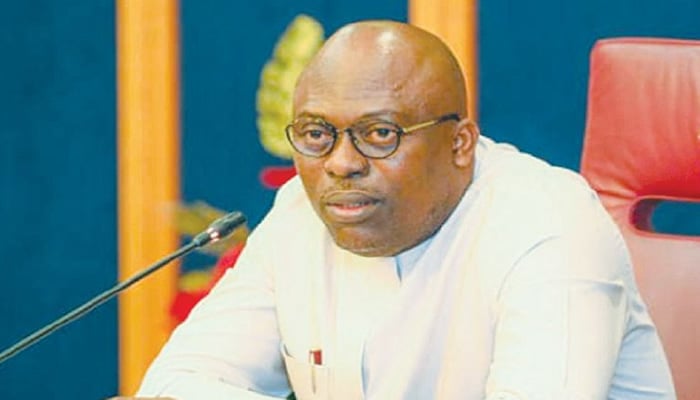Rivers State Governor, Siminalayi Fubara, embarked on a mission to restore political stability and economic prosperity to his state following a period of intense political turmoil. A key step in this process was his visit to President Bola Tinubu in Abuja, signifying a return to normalcy after the lifting of the six-month emergency rule imposed due to a bitter feud between Fubara and his predecessor, Nyesom Wike, now the Minister of the Federal Capital Territory. Fubara emphasized the re-establishment of peace and cooperation within the state government, describing his relationship with Wike as reconciled and collaborative. His meeting with President Tinubu served as both a courtesy call and an opportunity to seek guidance as he navigated the challenges of governing in the wake of the political crisis. The emergency rule had resulted in the suspension of key political figures, including Fubara himself, and the Supreme Court had declared a state of no effective government due to the breakdown in relations between their respective loyalists in the state assembly.
The political crisis had far-reaching consequences, jeopardizing critical infrastructure, including oil pipelines, and threatening the stability of the oil-rich state. Fubara’s focus shifted towards addressing the economic underperformance of Rivers State, particularly concerning the underutilization of its two key seaports, Port Harcourt and Onne. He recognized the immense economic potential these ports represented, lamenting the lost opportunities for job creation, investment attraction, and overall economic growth. He stressed that world-class ports and airports are crucial drivers of prosperity globally, and Rivers State needed to leverage its strategic advantage in this area.
Governor Fubara welcomed a delegation from the Nigerian Ports Authority (NPA), led by Chairman Senator Adeyeye Adedayo Clement, to discuss strategies for revitalizing the ports. He painted a picture of the transformative impact that a fully operational Onne Port could have on the surrounding areas, envisioning increased economic activity, employment opportunities, and expansion in related sectors like manufacturing and logistics. Optimizing the capacity of both ports, he argued, would attract industries seeking efficient export facilities, reduce logistics costs, and boost investor confidence, ultimately leading to increased tax revenues for the state. Fubara emphasized the relatively peaceful environment prevailing in Rivers State under his administration, which he contrasted with disruptions experienced elsewhere, facilitating smoother relations between host communities, the government, and the port authority.
However, significant challenges remained. Fubara highlighted the poor condition of federal roads leading to the ports as a major impediment to their efficient operation. While acknowledging that road repairs fell under federal jurisdiction, he pledged the state’s support through traffic management measures, improved discipline among trailer drivers, and other complementary initiatives to mitigate congestion. Recognizing the link between unemployment and insecurity, the governor promised to enhance security within the port precincts by establishing a new police station, believing that increased economic activity at the ports would reduce youth restiveness and crime.
Land encroachment posed another threat to port development, and Fubara urged the NPA to provide details of encroachment cases for immediate government intervention. He also addressed the issue of flooding, attributing it to poor access roads and drainage systems, and committed to collaborating with the NPA on remedial works once the affected areas were identified. Commending the NPA for its proactive approach in partnering with the state before embarking on intervention projects, Fubara underscored the importance of community buy-in for the sustainability of such initiatives.
The Governor’s overarching message was one of partnership and a shared vision for transforming the Rivers State seaports from symbols of neglect into engines of economic growth. He called for collaborative efforts to address the challenges of infrastructure, security, and community relations, emphasizing the potential of these ports to drive prosperity and create opportunities for the people of Rivers State. Fubara’s commitment to revitalizing the ports was not merely an economic strategy but also a critical step toward securing long-term stability and peace in a region grappling with the aftermath of political upheaval. His focus on job creation and economic development was intrinsically linked to his broader goal of fostering a more secure and prosperous future for the state.
The meeting with the NPA delegation served as a crucial platform for solidifying the partnership between the state government and the port authority. Fubara’s emphasis on collaboration, transparency, and community engagement signaled a new approach to port management, one that prioritized the long-term interests of the state and its people. By addressing the root causes of insecurity, such as unemployment and poor infrastructure, Fubara aimed to create a virtuous cycle of economic development and social stability. His vision for the Rivers State seaports extended beyond their economic potential, encompassing a broader strategy for achieving lasting peace and prosperity in the region. He recognized that transforming these ports into thriving economic hubs would not only generate revenue and create jobs but also contribute to a more secure and resilient society.


